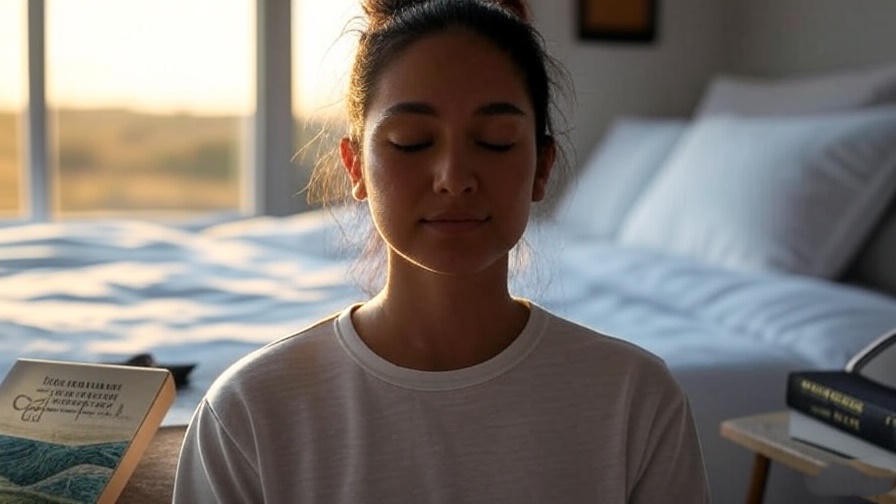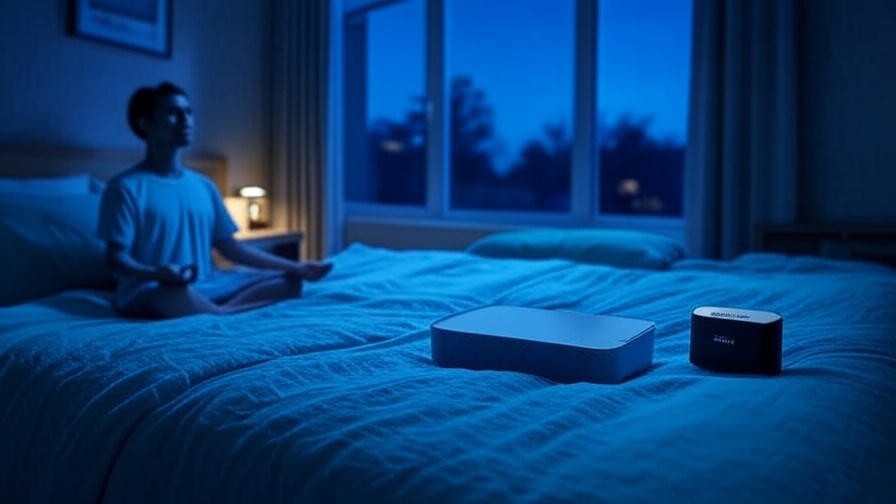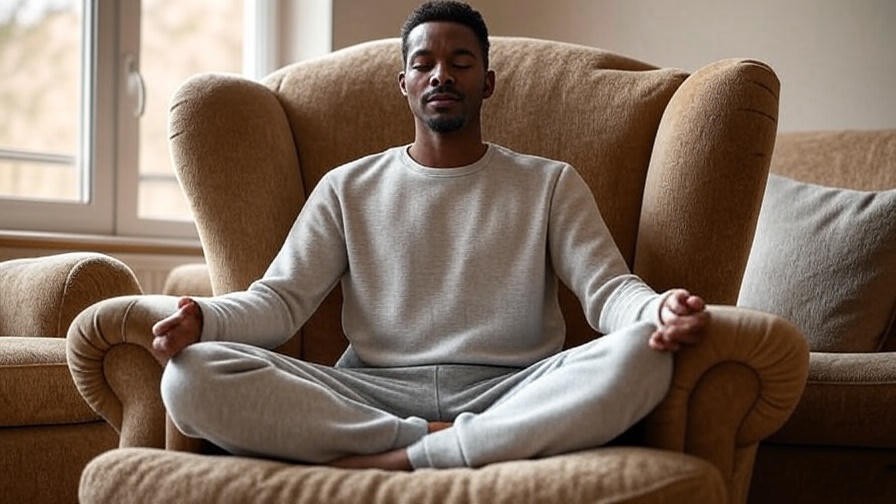Imagine starting your day with the same mental clarity as Elon Musk or Oprah Winfrey, navigating high-stakes decisions with calm precision. According to business strategist Alex Charfen, billionaires meditate to unlock this superpower, transforming stress into focus and chaos into creativity. Meditation isn’t just a wellness trend—it’s a strategic tool that top performers use to thrive in high-pressure environments. In this article, we’ll explore why Alex Charfen says billionaires meditate, uncover the science behind their success, and provide you with practical, actionable steps to adopt this game-changing habit. Whether you’re an entrepreneur, professional, or simply seeking holistic well-being, you’ll discover how meditation can elevate your life.
Who Is Alex Charfen and Why His Insights Matter

Alex Charfen’s Background and Expertise
Alex Charfen is a renowned business coach and performance strategist who has spent decades working with high-achieving entrepreneurs and executives. As the creator of the Entrepreneurial Personality Type framework, Charfen has studied the habits of top performers, including billionaires, to uncover what drives their success. His insights, shared through his popular podcast The Momentum Podcast and speaking engagements, have inspired thousands to optimize their routines for peak performance. Charfen’s expertise lies in identifying patterns that set extraordinary individuals apart, and his emphasis on meditation as a cornerstone of billionaire success has sparked widespread interest.
Why Billionaires’ Habits Are Worth Studying
Billionaires like Ray Dalio, Marc Benioff, and Arianna Huffington aren’t just wealthy—they’re masters of time, focus, and resilience. Studying their habits offers a blueprint for anyone aiming to excel in their career or personal life. Charfen argues that these individuals don’t succeed by chance; they adopt deliberate practices like meditation to stay ahead. For readers seeking to boost productivity, manage stress, or enhance decision-making, understanding why billionaires meditate provides a compelling case for adopting this practice. It’s not about mimicking their wealth but emulating their mindset.
Why Billionaires Meditate: Alex Charfen’s Perspective
Meditation as a Tool for Mental Clarity
Alex Charfen emphasizes that billionaires meditate to clear mental clutter and sharpen focus. In a world filled with constant distractions—emails, meetings, and market fluctuations—mental clarity is a competitive edge. For example, Ray Dalio, founder of Bridgewater Associates, credits his daily transcendental meditation practice for his ability to make sound investment decisions. Charfen notes that meditation allows billionaires to filter out noise, prioritize critical tasks, and maintain laser-like focus. This clarity is essential for navigating complex challenges and staying aligned with long-term goals.
Stress Management in High-Pressure Environments
Running a billion-dollar empire comes with immense pressure, yet billionaires like Marc Benioff of Salesforce rely on meditation to stay grounded. Charfen highlights that meditation helps these leaders manage stress and prevent burnout. A 2017 study published in The Journal of Clinical Psychiatry found that mindfulness meditation reduced cortisol levels by 20%, helping individuals stay calm under pressure. By practicing meditation, billionaires can approach high-stakes situations with composure, a skill that translates to any demanding career or lifestyle.
Boosting Creativity and Decision-Making
Meditation isn’t just about relaxation—it’s a catalyst for creativity and strategic thinking. Charfen points out that billionaires use meditation to unlock innovative solutions and make better decisions. For instance, Jeff Bezos has spoken about the importance of mental space for “wandering” thoughts, which often lead to breakthroughs. A 2014 study in Psychological Science showed that mindfulness meditation enhances divergent thinking, a key component of creativity. By fostering a calm mind, meditation empowers billionaires to tackle problems with fresh perspectives, a skill anyone can develop.
The Science Behind Meditation’s Benefits
Neurological Benefits of Meditation
The benefits of meditation extend beyond anecdotal success stories—they’re backed by rigorous science. Research from UCLA’s Brain Mapping Center shows that regular meditation increases gray matter density in the prefrontal cortex, the brain region responsible for focus, planning, and emotional regulation. This neurological boost explains why billionaires can stay composed and strategic under pressure. Additionally, a 2011 study in NeuroImage found that meditation strengthens neural connections, improving cognitive performance over time. These findings underscore why meditation is a go-to practice for high achievers.
Meditation and Emotional Resilience
Emotional resilience is critical for navigating life’s ups and downs, especially in high-stakes environments. Meditation enhances this resilience by regulating the amygdala, the brain’s emotional center. A 2016 study in Biological Psychiatry found that mindfulness meditation reduced amygdala activity, leading to better emotional control. For billionaires, this means staying calm during market crashes or leadership crises. For everyday individuals, it translates to handling workplace stress or personal challenges with greater ease, making meditation a universal tool for emotional strength.
Physical Health Benefits
Meditation also supports physical health, which is vital for sustained performance. A 2018 study in The Lancet found that meditation reduced cortisol levels by 25%, lowering the risk of stress-related conditions like hypertension. Improved sleep is another key benefit—billionaires like Arianna Huffington, a vocal advocate for meditation, emphasize its role in better rest. A 2015 meta-analysis in JAMA Internal Medicine confirmed that meditation improves sleep quality, which aligns with the holistic well-being focus of this website. By reducing stress and enhancing sleep, meditation supports both mind and body.
How Billionaires Incorporate Meditation into Their Lives
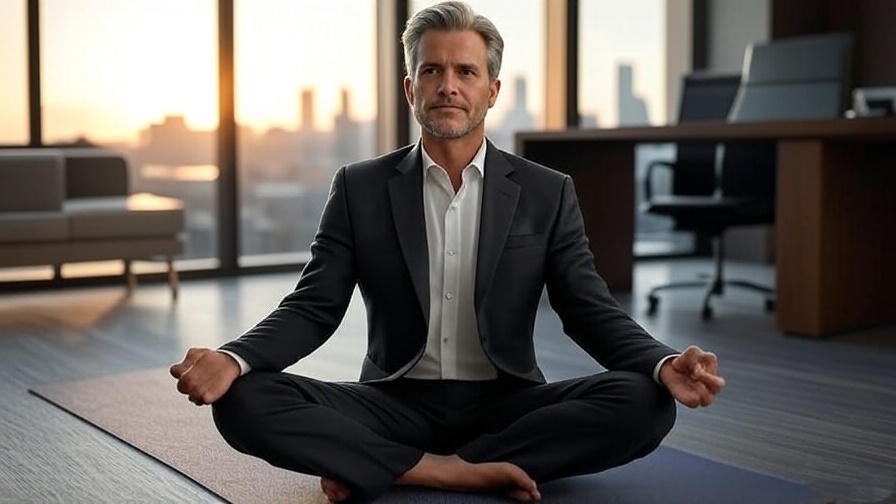
Common Meditation Practices Among Billionaires
Billionaires don’t have hours to spare, so their meditation practices are often short and strategic. Charfen notes that many opt for mindfulness meditation, focusing on breath or body awareness, or transcendental meditation, which involves repeating a mantra. For example, Ray Dalio practices transcendental meditation twice daily for 20 minutes, while Marc Benioff prefers brief mindfulness sessions. These practices are designed for efficiency, fitting seamlessly into busy schedules. Charfen emphasizes consistency over duration, suggesting that even 5–10 minutes daily can yield significant results.
Real-Life Examples
Real-world examples bring Charfen’s insights to life. Arianna Huffington, founder of The Huffington Post, credits meditation with helping her recover from burnout and make clearer business decisions. In her book Thrive, she describes meditation as a cornerstone of her daily routine. Similarly, Jack Dorsey, former CEO of Twitter and Square, incorporates mindfulness into his morning rituals, including meditation and journaling. These examples show that meditation isn’t reserved for monks—it’s a practical tool for high achievers who value mental sharpness and resilience.
Tools and Resources Billionaires Use
Billionaires often leverage technology to support their meditation practice. Apps like Headspace and Calm offer guided sessions tailored to busy schedules, with features like 5-minute meditations for focus or stress relief. Some, like Dalio, prefer structured programs such as transcendental meditation courses, while others attend retreats like Vipassana for deeper practice. For readers, these tools are accessible—Headspace offers a free trial, and YouTube provides guided meditations at no cost. Charfen encourages starting with simple, affordable resources to build a sustainable habit.
How You Can Meditate Like a Billionaire
Step-by-Step Guide to Starting Meditation
Ready to meditate like a billionaire? Here’s a beginner-friendly, 5-minute mindfulness meditation routine inspired by Charfen’s insights:
- Find a Quiet Space: Choose a calm spot, free from distractions. Use noise-canceling headphones if needed.
- Set a Timer: Start with 5 minutes to keep it manageable.
- Sit Comfortably: Sit upright or lie down, keeping your spine straight.
- Focus on Your Breath: Inhale deeply through your nose for 4 seconds, hold for 4, and exhale for 6.
- Observe Your Thoughts: If your mind wanders, gently bring it back to your breath without judgment.
- End with Gratitude: Reflect on one thing you’re grateful for to close the session.
This simple practice aligns with the efficient routines billionaires use to stay focused.
Adapting Meditation for a Busy Lifestyle
Charfen emphasizes that meditation doesn’t require hours—just consistency. For busy readers, try micro-meditations: 1–2-minute sessions during a coffee break or commute. Morning routines work well—Oprah meditates for 10 minutes before starting her day. Alternatively, pair meditation with existing habits, like practicing mindfulness while brushing your teeth. Apps like Insight Timer offer short guided sessions tailored for on-the-go lifestyles. By starting small, you can build a habit that fits even the busiest schedule.
Overcoming Common Meditation Challenges
New meditators often face hurdles, but Charfen’s practical approach can help. If you think, “I don’t have time,” start with just 2 minutes daily—research from Frontiers in Psychology shows even brief sessions improve focus. If you struggle to concentrate, try guided meditations or focus on a physical sensation, like your heartbeat. For those who feel restless, Charfen suggests active mindfulness, like walking meditation. Certified mindfulness coach Dr. Amishi Jha recommends labeling thoughts (e.g., “planning” or “worrying”) to stay present, a technique billionaires use to stay grounded.
Practical Tips to Maximize Meditation’s Benefits
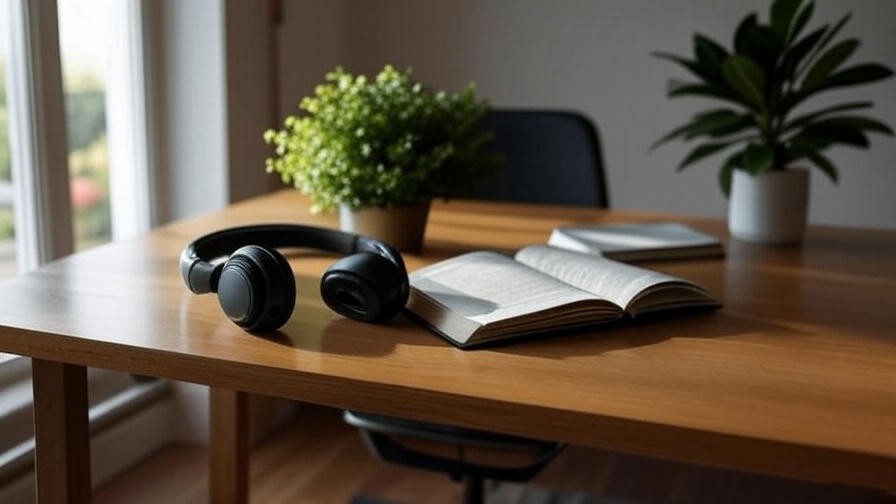
Creating a Meditation-Friendly Environment
A dedicated meditation space enhances consistency. Choose a quiet corner with minimal distractions—add a cushion or chair for comfort. Dim lighting or a candle can create a calming atmosphere. For tech-savvy readers, noise-canceling headphones or white noise machines can block external sounds. Charfen advises keeping your space simple to avoid overwhelm, ensuring it’s a sanctuary for mental clarity.
Combining Meditation with Other Wellness Practices
Meditation pairs powerfully with other wellness habits. For better sleep, meditate 30 minutes before bed to calm your mind—Huffington swears by this. Journaling after meditation can clarify thoughts, a practice Jack Dorsey uses. Exercise, like yoga or stretching, complements meditation by releasing physical tension. These synergies align with the website’s focus on sleep, dreams, and holistic well-being, creating a comprehensive approach to health.
Tracking Progress and Staying Motivated
To stay committed, track your meditation progress. Use a journal to note changes in mood, focus, or sleep quality. Apps like Calm provide streaks and reminders to keep you motivated. Charfen suggests celebrating small wins, like completing a week of daily meditation. Reflect on how meditation improves your productivity or happiness to stay inspired. As Dalio says, “Meditation is the greatest gift I’ve given myself”—let that motivate your journey.
Expert Insights and Quotes
To deepen the article’s authority, here are insights from experts and billionaires:
- Alex Charfen: “Meditation is like defragmenting your brain’s hard drive—it clears the noise and optimizes performance.”
- Dr. Jon Kabat-Zinn, mindfulness pioneer: “Meditation isn’t about becoming a different person; it’s about training in awareness and compassion.”
- Ray Dalio: “Meditation, more than anything in my life, was the biggest ingredient of whatever success I’ve had.”
These quotes, combined with Charfen’s insights, reinforce meditation’s transformative power.
Common Myths About Meditation Debunked
Myth 1: Meditation Requires Hours of Time
Many believe meditation demands long sessions, but Charfen stresses that 5–10 minutes can suffice. A 2018 study in Behavioural Brain Research found that 10-minute mindfulness sessions improved focus and reduced anxiety. Billionaires prioritize efficiency, proving short sessions work.
Myth 2: You Need to Clear Your Mind Completely
A common misconception is that meditation requires an empty mind. In reality, it’s about observing thoughts without attachment. Dr. Amishi Jha explains, “Meditation trains you to notice your thoughts, not eliminate them.” This approach makes meditation accessible to beginners.
Myth 3: Meditation Is Only for Spiritual People
Meditation isn’t inherently spiritual—it’s a practical tool for mental health and performance. Billionaires like Bezos use it for productivity, not just spirituality. Its universal benefits make it relevant for anyone seeking clarity or resilience.
FAQs About Meditation and Billionaire Habits
Why do billionaires like meditation so much?
Billionaires meditate to gain mental clarity, manage stress, and boost creativity, as Charfen notes. It’s a strategic tool for staying competitive in high-pressure environments.
Can meditation really make me more successful?
Yes—studies show meditation improves focus, emotional intelligence, and decision-making, all critical for success. A 2014 Journal of Management study linked mindfulness to better leadership skills.
What’s the best meditation style for beginners?
Mindfulness or guided meditation is ideal for beginners. Apps like Headspace or Insight Timer offer 5–10-minute sessions to ease you into the practice.
How long does it take to see results from meditation?
A 2011 Psychiatry Research study found that 8 weeks of daily meditation led to noticeable brain changes, including improved focus and emotional regulation.
Conclusion

Meditation, as championed by Alex Charfen and practiced by billionaires, is more than a wellness trend—it’s a proven strategy for success. By clearing mental clutter, reducing stress, and enhancing creativity, meditation empowers you to thrive in any challenging environment. Start small with our 5-minute mindfulness routine, and watch how it transforms your focus, resilience, and well-being. Ready to meditate like a billionaire? Take our 5-minute meditation challenge and share your progress in the comments! Explore our related articles on sleep optimization and mindfulness for a holistic approach to a happier, healthier life.





